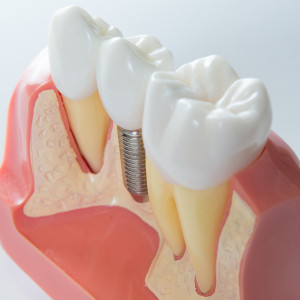


slider-wide-1
slider-wide-2
slider-wide-3
 Dental implants tend to be the best way to replace a lost tooth. They work very well if a person wants to restore a tooth while maintaining the natural appearance and function of their own tooth. Dentures or bridges can also be good choices to replace a missing tooth, but they do not offer similar durability and strength. Implants can also improve your jawbone.
Dental implants tend to be the best way to replace a lost tooth. They work very well if a person wants to restore a tooth while maintaining the natural appearance and function of their own tooth. Dentures or bridges can also be good choices to replace a missing tooth, but they do not offer similar durability and strength. Implants can also improve your jawbone.
Integration with Jawbone
Osteointegration, the process of the implants fusing with the bone, helps make dental implants incredibly sturdy. Most implants have a titanium post, and titanium is biocompatible. When this post is placed into one’s jawbone, the bone and metal bond. The dental implant is supported the same way that the original tooth’s root was. This means that the implant and crown will be as strong and functional as the original tooth, if not stronger.
Effect on the Jaw
If you lose a tooth, whether due to infection or trauma, your appearance isn’t all that’s at risk. Missing or damaged teeth can interfere with the way you smile, speak, and chew. The bones of your face also need to be stimulated in order to maintain their structure. This is typically provided by the tooth’s root as you bite and chew your food. If you lose a tooth, however, this stimulation is gone, and your jawbone will begin to break down; your body will no longer send calcium to your jaw at all, in fact.
After your jaw begins to shrink, your other teeth are also at risk, and your face may sag or start to collapse. Most of this absorption of the bone happens within the first year after you lose the tooth. This means that it’s vitally important to replace the missing teeth with implants as soon as you possibly can.
Dental implants are fused to the jawbone, so chewing with them continues to stimulate your bones. This is the same process as your natural tooth uses. The dental implant helps halt the reabsorption of bone, preserving your appearance. This helps maintain the function of your mouth and keep you looking young.
Implantation
Book an appointment with a local cosmetic dentist to find out more about dental implants and if you are a good candidate for the procedure. The dentist will handle a comprehensive oral and medical exam and take X-rays to assess the current bone mass of your jawbone. This is part of the process to decide if you are a good candidate for implants. If you’re a good fit, you’ll be scheduled for the surgery to insert the posts to your jawbone.
The procedure requires a few months for the titanium post to bond with your jaw, so you’ll be given a temporary crown until the osseointegration is complete. After this, you’ll be fitted with a permanent crown.
Dental implants can help preserve overall bone mass in the jaw and limit bone reabsorption. This makes them an excellent method to restore your original appearance after losing a tooth.